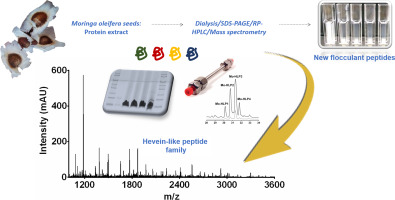当前位置:
X-MOL 学术
›
J. Proteomics
›
论文详情
Our official English website, www.x-mol.net, welcomes your
feedback! (Note: you will need to create a separate account there.)
Mo-HLPs: New flocculating agents identified from Moringa oleifera seeds belong to the hevein-like peptide family.
Journal of Proteomics ( IF 2.8 ) Pub Date : 2020-02-14 , DOI: 10.1016/j.jprot.2020.103692 Ana Márjory Paiva Sousa 1 , Hévila Oliveira Salles 2 , Hermógenes David de Oliveira 3 , Beatriz Blenda Pinheiro de Souza 4 , José de Lima Cardozo Filho 4 , Daniel Nogoceke Sifuentes 4 , Maura Vianna Prates 4 , Carlos Bloch Junior 4 , Marcelo Porto Bemquerer 4 , Antonio Silvio do Egito 2
Journal of Proteomics ( IF 2.8 ) Pub Date : 2020-02-14 , DOI: 10.1016/j.jprot.2020.103692 Ana Márjory Paiva Sousa 1 , Hévila Oliveira Salles 2 , Hermógenes David de Oliveira 3 , Beatriz Blenda Pinheiro de Souza 4 , José de Lima Cardozo Filho 4 , Daniel Nogoceke Sifuentes 4 , Maura Vianna Prates 4 , Carlos Bloch Junior 4 , Marcelo Porto Bemquerer 4 , Antonio Silvio do Egito 2
Affiliation

|
Cationic peptides found in Moringa oleifera seeds belong to different protein families and are described as the main flocculating agents of the species. In this study we report the identification and isolation of four new flocculant peptides, called Mo-HLPs 1-4, belonging to the family of hevein-like peptides, previously only known for their members' antimicrobial activity. Purification of the peptides followed two sequential membrane ultrafiltration steps and separation by reverse-phase liquid chromatography. Proteomic analyses showed that Mo-HLPs are extremely basic (pI >10) cysteine-rich molecules with molecular masses between 4.5 and 4.8 kDa and with a highly conserved chitin-binding domain. Searches in BLAST revealed high similarity of Mo-HLPs with hevein and other hevein-like peptides and 90% identity with morintides, which are members of the 8C-hevein-like subfamily found in M. oleifera leaves. Mo-HLPs microflocculation assays showed distinct coagulation/flocculation efficiencies, promoting turbidity reduction levels between 67 and 89% in synthetic turbid water. Activity variations were attributed to the substitution of some amino acids among the isoforms, which may have altered the final net charge of the molecules. The identification of Mo-HLPs represents the discovery of a new group of cationic peptides involved in the flocculation properties of M. oleifera seeds. SIGNIFICANCE: The study reveals the presence of hevein-like peptides in Moringa oleifera seeds. It is reported for the first time that members of this family have properties to act as flocculating agents of importance for water treatment processes. The identification of these peptides as well as new functional assignment broadens the horizon for speculation on new species which could act as sources of green coagulants for sustainable water treatment, and contributes to the knowledge about occurrence, distribution, molecular and active diversity of peptides belonging to the hevein-like family.
中文翻译:

Mo-HLP:从辣木种子中鉴定出的新絮凝剂属于类肝素类肽家族。
在辣木种子中发现的阳离子肽属于不同的蛋白质家族,被描述为该物种的主要絮凝剂。在这项研究中,我们报告鉴定和分离了四个新的絮凝剂肽,称为Mo-HLPs 1-4,它们属于类肝素蛋白肽家族,以前仅因其成员的抗菌活性而闻名。肽的纯化遵循两个连续的膜超滤步骤,并通过反相液相色谱分离。蛋白质组学分析表明,Mo-HLPs是极其碱性的(pI> 10)富含半胱氨酸的分子,分子量在4.5至4.8 kDa之间,并具有高度保守的几丁质结合域。在BLAST中进行的搜索显示,Mo-HLP与肝素和其他肝素样肽具有高度相似性,并且与吗啉类化合物具有90%的一致性,它们是在油橄榄叶中发现的8C-hevein样亚科的成员。Mo-HLPs微絮凝测定法显示出独特的混凝/絮凝效率,在合成混浊水中使混浊度降低水平达到67%至89%。活性变化归因于同工型中某些氨基酸的取代,这可能已经改变了分子的最终净电荷。Mo-HLPs的鉴定代表了新的一类涉及油茶种子絮凝特性的阳离子肽的发现。意义:该研究揭示了辣木种子中存在vevein样肽。首次报道该家族的成员具有充当水处理过程中重要的絮凝剂的特性。
更新日期:2020-02-20
中文翻译:

Mo-HLP:从辣木种子中鉴定出的新絮凝剂属于类肝素类肽家族。
在辣木种子中发现的阳离子肽属于不同的蛋白质家族,被描述为该物种的主要絮凝剂。在这项研究中,我们报告鉴定和分离了四个新的絮凝剂肽,称为Mo-HLPs 1-4,它们属于类肝素蛋白肽家族,以前仅因其成员的抗菌活性而闻名。肽的纯化遵循两个连续的膜超滤步骤,并通过反相液相色谱分离。蛋白质组学分析表明,Mo-HLPs是极其碱性的(pI> 10)富含半胱氨酸的分子,分子量在4.5至4.8 kDa之间,并具有高度保守的几丁质结合域。在BLAST中进行的搜索显示,Mo-HLP与肝素和其他肝素样肽具有高度相似性,并且与吗啉类化合物具有90%的一致性,它们是在油橄榄叶中发现的8C-hevein样亚科的成员。Mo-HLPs微絮凝测定法显示出独特的混凝/絮凝效率,在合成混浊水中使混浊度降低水平达到67%至89%。活性变化归因于同工型中某些氨基酸的取代,这可能已经改变了分子的最终净电荷。Mo-HLPs的鉴定代表了新的一类涉及油茶种子絮凝特性的阳离子肽的发现。意义:该研究揭示了辣木种子中存在vevein样肽。首次报道该家族的成员具有充当水处理过程中重要的絮凝剂的特性。











































 京公网安备 11010802027423号
京公网安备 11010802027423号